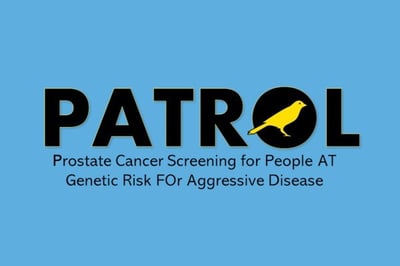PATROL Study: Prostate Cancer Screening for People AT Genetic Risk FOr Aggressive Disease

Prevention
Screening study for people with a mutation linked to prostate cancer risk
Clinicaltrials.gov identifier:NCT04472338
Study Contact Information:
Contact patrol@uw.edu or by phone at 206-210-4040.
About the Study
The PATROL ( Cancer Screening for People AT Genetic Risk FOr Aggressive Disease) study is for people at risk for cancer because they carry one or more genes that are known or suspected to increase cancer risk: , , , , , , , , , , , or .
This is a good study for people who wish to be proactive about their care and contribute to studying new ways of monitoring for cancer risk, including studying new markers for finding cancer early. Participation involves study visits approximately once a year with physical exam, blood tests (including ) and urine test. Biopsies and imaging may be advised based on exam and blood test results. There are also patient questionnaires. Contact patrol@uw.edu or go to http://sites.uw.edu/patrolstudy for more information.
This Study is Open To:
The study is open to people with prostates, who are at least 40 years old AND:
- Have an known in the following genes: , , , , , , , , , , , or .
- Do not already have a diagnosis of cancer.
- Are able to provide written informed consent.
This Study is NOT Open To:
People with the following are not eligible:
- have another cancer treated within the past 12 months (e.g. surgery, radiation, chemotherapy, ) for all cancer types except non melanoma skin cancer.
- prior participation or plan to participate in a clinical trial intended to prevent cancer for people with genetic mutations linked to risk.
- Unable or unwilling to complete clinical care and study procedures as indicated by the study requirements.
- Prior or concurrent participation in an interventional clinical trial aimed at preventing cancer for people with variants associated with increased cancer risk.
What the Study Involves
The PATROL study is an early-detection screening study. Study procedures include annual clinic visit, ( Specific Antigen) blood test, and imaging as deemed necessary by your doctor. A biopsy may be recommended based on age and if you are:
- under 50, with a over 1.0 ng/mL
- between 50 and 59 with a over 1.5 ng/mL
- over 60 with a over 2.0 ng/mL
At each annual PATROL visit, participants will be asked to fill out a survey, and blood and urine samples will be collected for the PATROL biorepository. The annual visits and collections will be conducted for 10 years after enrollment. For people who are diagnosed with cancer during the study, the medical care plan will be determined by the patient’s urologist and medical team.
Lead Researchers/Study PIs and Affiliation
Heather H. Cheng, MD, PhD University of Washington / Fred Hutchinson Cancer Center;
Daniel W. Lin, MD; University of Washington
patrol@uw.edu
Study Contact Information:
Contact patrol@uw.edu or by phone at 206-210-4040.
Locations:
California
City: Duarte RECRUITING
Facility: City of Hope
Contact Info:
Joanne Jeter, MD
City: San Francisco RECRUITING
Facility: University of California, San Francisco
Contact Info:
ada.sanchez@ucsf.edu
Matthew Cooperberg, MD, MPH
Illinois
City: Chicago RECRUITING
Facility: Northwestern
Contact Info:
Sophia.kallas@northwestern.edu
Edward Schaeffer, MD, PhD
Hiten Patel, MD, MPH
Massachusetts
City: Boston RECRUITING
Facility: Massachusetts General Hospital
Contact Info:
Keyan Salari, MD, PhD
Oregon
City: Portland RECRUITING
Facility: OHSU Knight Cancer Institute
Contact Info:
cedartrials@ohsu.edu
503-418-8150
Alexandra Sokolova, MD
Pennsylvania
City: Philadelphia RECRUITING
Facility: University of Pennsylvania/Abramson Cancer Center
Contact Info:
PATROL@pennmedicine.upenn.edu
215-615-3004
Kara Maxwell, MD, PhD
Washington
City: Seattle RECRUITING
Facility: Fred Hutch/University of Washington Cancer Consortium
Contact Info:
patrol@uw.edu
206-210-4040
Heather H. Cheng, MD, PhD
Prevention
Screening study for people with a mutation linked to prostate cancer risk
Clinicaltrials.gov identifier:NCT04472338
Study Contact Information:
Contact patrol@uw.edu or by phone at 206-210-4040.